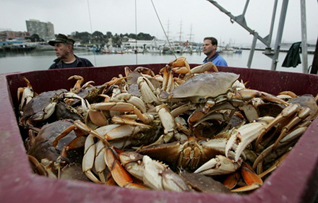 ing poached Russian crab from entering Japan took effect on 1 April, after years of Japanese foot dragging. In response to the new documentation requirements, processing of illegal crab is expected to shift to China and Vietnam.
ing poached Russian crab from entering Japan took effect on 1 April, after years of Japanese foot dragging. In response to the new documentation requirements, processing of illegal crab is expected to shift to China and Vietnam.Because of the economic importance of crab processing to the economy of Hokkaido, Japan’s northernmost island, the Japanese government has long turned a blind eye to the landing, processing and sale of illegally harvested crab. The path to implementation of the agreement has been long.
Russia has pushed Japan for years to close its market to illegal, unreported and undocumented (IUU) marine products. Consultations between the two countries began in 2002, with the intention of reaching an agreement covering a wide variety of seafood species, but in the event, only crab was covered. Crab, mainly king and snow (opilio) crab, is the most valuable of the poached Russian products that find a market in Japan. A comparison of import data with official harvest quotas conducted by the Juneau, Alaska-based McDowell Group showed that 50 to 60 percent of the Russian crab harvest in recent years has been illegal.
After ten years of consultations and Russian urging, on September of 2012 Japan and Russia finally signed an agreement obliging Japan to demand and verify Certificates of Origin for imports of both processed and unprocessed crab. However, actual implementation took more than a year, during which time Japan’s Fisheries Agency and Ministry of Economy, Trade and Industry (METI) held briefing sessions in Tokyo and Hokkaido to hear concerns of importers and other industry participants and to explain the procedures.
Basically, certificates of origin are to be submitted to Japanese Customs for whole fresh, chilled or frozen crab, while certifications for processed crab are to be submitted to METI. These agencies are then supposed to verify the authenticity of the certifications with the Russian government.
During 2013, as the Russian government increased fishery surveillance in its Far East, poachers shifted their effort from opilio crab to the higher value red king crab, looking to get higher returns for the risks they were taking, and imports spiked. The Russian Federal Customs Service showed legal exports to Japan of only 600 metric tons (MT) in the first half of the year, while Japanese import figures showed 30 times that.
Now that the Japanese government has began to require the certificates, the local economies of Wakkanai and other northern Hokkaido towns are expected to suffer from a contraction in the crab processing business, as more crab is trans-shipped via South Korea, and in many cases processed in China or Vietnam.
Many local processors are already suffering financially from changes in the migration patterns of Pacific saury, an important local species, due to climate change. The fish are staying farther to the northeast delaying the season and requiring longer journeys to the fishing grounds. Higher fuel costs caused by the weak yen are also taking a toll. Wakkanai’s population of 37,000, could decrease by as much as 10,000 in the years ahead as seafood processing jobs are lost, though a fair number of the workers there are seasonal migrants.
In the transshipping trade, cargo vessels take on the poached crab at sea and carry it to South Korea where forged documents are presented in order to obtain South Korean export documents. A treaty was signed in December 2009 between South Korea and Russia, but it only applies to product for sale inside Korea. Product to be re-exported can receive Korean shipping documents based on non-verified forged Russian certificates, and thus the crab is laundered. From there it may be sent directly to Japan, or sent to China or Vietnam for processing and thence to the U.S. or Japan.
This is such a problem that Russia has tied the granting of a fishing quota to Korea for pollock to progress in stopping the transshipping of IUU crab. South Korea will be allowed to catch 30,000 MT (up from 25,000 MT in 2013) with an additional 10,000 MT to be allowed to South Korean boats after 31 August if South Korea successfully blocks the entry of all illegally caught Russian crabs.





